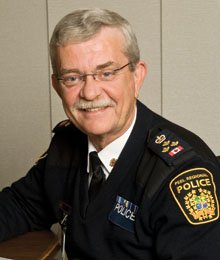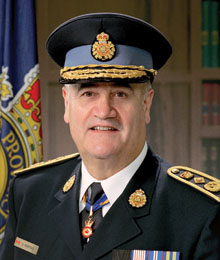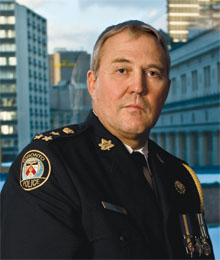The Men Behind the Uniform
February 2, 2009 by City Life Staff
Filed under General Interest

A career in policing is anything but easy, especially when you’re in charge of the entire force. This special series examines the men responsible for overseeing provincial and municipal police services, with an exclusive look into their off-duty personas.
HALTON REGION
Loving a Good Day’s Work: Greg Crowell

Chief Greg Crowell
Finding happiness in life can sometimes mean doing what you love best. Whatever that is, it should make you want to spring out of bed every morning, and look forward to a good day’s work. Of course, it isn’t easy to make sure one of Canada’s safest regions stays crime-free – a job that belongs to Chief Greg Crowell of the Halton Regional Police Service. Leading his organization is no small task, especially in a community that’s also recognized as one of the fastest growing in the country.
Starting out as an RCMP officer in Nova Scotia, Crowell hasn’t looked back since his first day on the job. “I can probably count, only on one hand, the days I haven’t enjoyed going into work,” he reveals. Coming to a crossroads in college, Crowell decided to become a police officer after a recruiting poster caught his eye. Right from the start, it was something he revered. “I really love the profession. Police officers are truly my heroes,” he says openly.
His enthusiasm speaks louder than words, as his career boasts a series of accomplishments. The introduction of his organization’s Enhanced Language Instruction program allows immigrants with law enforcement backgrounds to enhance their skills, opening the door to a job in Canadian policing. Crowell’s support for female officers is another notable endeavour, making him the first recipient of the Ontario Women in Law Enforcement President’s Award. “Not only can women do the job just as well, but sometimes even better,” he admits. “I came to respect their role after I saw how hard it was for women to progress through the ranks.” It’s one of many lessons Crowell has learned, admiring the motto of former Peel Police Chief Bill Teggart, who once told him to, “be a student of your profession.”
True to his word, Crowell admits to learning from fellow officers. His admiration for Dr. Stephen Lewis, a fervent philanthropist, developed after discovering the humanitarian’s work through a family member. “I actually had my eyes opened by my own son, who’s a police officer in Waterloo. He and his wife travelled to Africa and worked at an orphanage on their vacation.” The trip had a heavy impact on Crowell’s understanding of the atrocities taking place in Third World countries.
Evolving into his current position through a strong work ethic and memorable experiences, Crowell admits that he was no stranger to first-day jitters when he first donned his uniform. While on his way to Halifax, Crowell noticed pedestrians waving friendly hellos as his cruiser drove by. “Then I realized they weren’t really waving at me,” he says laughing. “They were trying to tell me I was going the wrong direction down a one-way street. It was a real ego deflator.” Smiling about the comical ordeal, Crowell comes across as deeply satisfied with his service in law enforcement, admitting to being “a happy chief.” www.hrps.on.ca
 PEEL REGION
PEEL REGION
Driving Crime Away: Mike Metcalf
It’s a cool, crisp summer morning. The sun penetrates the trees as it illuminates the dew on short blades of grass. Three men walk onto the green at the Trafalgar Golf & Country Club in Milton, taking advantage of some much-needed recreational downtime. The threesome consists of two chiefs from the local fire and police departments and a third, younger man. The 20-year-old talks about a possible career in professional golf to his friends. That was almost 40 years ago and today, things look a lot different for Peel Regional Police Chief Mike Metcalf.
“I played a lot of junior golf but I really couldn’t putt all that well,” he says with a laugh. Metcalf’s voice radiates authority, accompanied by a jovial sense of humour. It didn’t take long before Metcalf’s two golf buddies offered him jobs with the city’s emergency services. Thinking it through, he decided to join what was then called the Mississauga Township Police Department. “I can’t really explain it. I think it had a lot to do with my dad being a lawyer,” he recalls. Metcalf remembers being intrigued by police officers visiting his father’s home, often seeking advice from the crown attorney.
Looking back on a long and successful career, Metcalf tells me about some of his most enjoyable moments and crowning achievements. Working as a detective during the Mississauga train derailment of 1979, he quickly ascended the ranks after receiving the Medal of Bravery. “We went up in a chopper, approached the wreck, and tried to see how we were going to proceed with the evacuation.” Since then, Metcalf has revamped Peel Regional Police from the inside out, introducing the Automated Mug Shot Retrieval System in the early ‘90s.
After being promoted to detective sergeant, inspector, and superintendent, Metcalf never imagined being chief. “When I first started in the Criminal Investigation Branch, I honestly thought that would be the best – but it got better,” he admits. Taking the organization’s top job, Metcalf made further changes during his term. He created three deputy chief positions to tackle operational issues and brought in a special support program for front line officers. “I always wanted to create a bureau for organizational wellness. There’s a lot of stress in policing and it’s important to have peer help and members’ assistance.”
Metcalf’s compassion further reveals itself as he tells me about his favourite actor, James Earl Jones. “I’ll always remember him in Field of Dreams. His character was so rude in the beginning, but as you get below the crust, you find a good man.” Hoping people remember him for treating everyone with dignity, Metcalf points out that being chief isn’t his greatest achievement. Next to his career, the chief’s two daughters and wife, Barb, make him what he calls, “successful, grateful, and deeply satisfied,” – something I noticed right away. Instantly captivating with a witty and sharp persona, Metcalf is a man of profound character. www.peelpolice.on.ca
 YORK REGION
YORK REGION
Serving Proudly: Armand La Barge
For Armand La Barge, being a fiercely proud Canadian goes hand-in-hand with making a difference in the world. Descending from a lineage of military service and law enforcement, the Chief of York Regional Police is no stranger to one of Canada’s most safe and diverse communities. With a wife, cousin, and two brothers in policing, he’s carrying on a tradition that shows just how loudly deeds speak.
Originally passionate about the Canadian Armed Forces, La Barge first considered a career in the military. That changed when an OPP officer told a young La Barge about a new police force in Newmarket. While he never joined the Armed Forces, La Barge always admired Canadian soldiers from day one. “My two cousins were killed in the Second World War. I didn’t get a chance to meet them, but I’ve carried their photographs in my hat since I began policing,” he reveals.
Talking to La Barge about his organization, I get the impression of a very scholarly man. Holding a masters degree in Canadian and native studies, he’s also earned recognitions from Schulich School of Business and FBI National Academy. A proud leader, La Barge tells me about how he introduced the service to strategies that combat youth violence, which gained worldwide recognition after winning the Webber Seavey Award.
Getting to know him a little more, I notice his enthusiasm when talking about diversity. “I think the biggest significant change I’ve made is breaking down barriers in our immigrant communities,” he admits. The chief attributes his inspiration to the late Kamil Sadiq, a neighborhood leader dedicated to bringing religious, racial and social groups together.
During his six-year term, La Barge acknowledges increased esteem for his street officers. “I can tell you that any chief, myself included, would admit that if we were put back into the frontlines, we would struggle to do the challenging calls our officers do today.” La Barge’s remark comes at the end of a difficult year for the York Regional Police, which lost officers Davis Ahlowalia and Robert Plunkett and civilian member Deb Young. “I look at their pictures everyday and it reminds me that you don’t have to be a certain age, a chief of police or the president of a company to make a difference.”
When La Barge finally breaks away from work, his ideal vacation is at home. “I’ll watch movies with my wife and I shamefully admit they’re generally chick flicks,” he chuckles. As my conversation with him draws to a close, he adds with ardent conviction: “I think kids should remember respect for themselves and others. The more you respect yourself, the less you’ll run into trouble with the law.” www.police.york.on.ca
 ONTARIO
ONTARIO
With Great Responsibility Comes Great Sacrifice: Julian Fantino
It’s a tough job, and somebody’s doing it. That’s the phrase that comes to mind when I think of Julian Fantino, the province’s top cop. Serving as commissioner for the Ontario Provincial Police (OPP), a jurisdiction with over 300 municipalities can’t be easy – especially when you’re often criticized. And yet amidst being so busy with his organization’s centenary events, Fantino agrees to a one-on-one exclusive interview, revealing a less-familiar side of the media-disparaged man.
After dusting off his blue and gold peaked cap, Fantino greets me with a smile, reminiscent of an explorer with a thousand stories to tell. Sitting down in a secured, brightly lit room, with a private aid just outside the door, I ask Fantino about his younger years. “Coming to Canada at age 10 was a big challenge with a tremendous amount of difficulty,” he says, explaining that non-English-speaking kids were picked on. “Some people have accused me of being a racist, but they don’t know what I experienced – a lot of racism and a lot of discrimination.”
New challenges weren’t enough to discourage the young Fantino, who started working as a Toronto taxi driver and security officer at Yorkdale Mall. “I was always involved in investigations with local police officers, so I got talked into joining the Auxiliary,” he says of the city’s volunteer police force. “After five years, I became more interested, and I decided going full-time would be a good move.” Since then, Fantino’s law enforcement career brought him to work as Chief of the London Police Service, York Regional Police and the Toronto Police Service.
Serving later as commissioner of emergency management and commissioner of the OPP, Fantino is anything but complacent. Pedestrians and motorists throughout Ontario often see him out in the cold with frontline officers, helping with RIDE spot checks. On the administrative side of things, he’s helped put a new face on the OPP, re-adopting its former black and white scout cars and traditional blue caps. When I ask what legacy he hopes to leave, Fantino answers, “I tried to make a difference for the better, and the report-card can be left to someone else.” A man of great principle, he tells me that, “Being a police officer is very often referred to as a vocation. There’s a lot of sacrifice.”
Of course, when Fantino isn’t busy serving and protecting, he enjoys mealtimes with his wife, children and grandchildren. “All I do is the barbecue. And that’s it,” he admits with a laugh. It’s a lighter side of the man behind the uniform, who sometimes wears a chef hat and apron at children’s charity fundraisers – a pastime Fantino will maintain after retirement. As for now, he celebrates 2009’s 100th anniversary of the OPP, with a number of events taking place around the province throughout the year. The commissioner’s excitement in celebrating with the community is obvious. “The overwhelming majority of law-abiding, decent citizens, understand and appreciate what we do.” www.opp.ca, www.opp100.ca
 TORONTO
TORONTO
Keeping the City Safe: Bill Blair
The bigger a city is, the tougher the challenges. In a massive metropolis such as Toronto, there’s nothing more demanding than being a police officer. Enforcing the law for over two million citizens that speak more than 140 languages and dialects takes commitment and dedication. And behind the frontline officers of the Toronto Police Service is a man who fills big shoes – officially, and literally. As I walk down a hallway toward a private office at the Toronto police headquarters, I see a man in an armchair next to a coffee table, adjusting his reading glasses. He stands to greet me, and I realize how tall Chief Bill Blair really is, forcing me to link his height with the importance of his position.
Surrounded by a top-floor window view of the city’s skyscrapers, Blair tells me about some key initiatives. “The secret to keeping the city safe is to have open communication and trusting relationships with its citizens,” he says. Building on that foundation, the chief established the Targeted Anti-Violence Intervention Strategy, also known as TAVIS, to reduce violence and fear on the streets. “The city of Toronto is the city of neighbourhoods,” he explains, with a clear message for people using guns illegally. “We will pursue you relentlessly. And if you take up that gun, you put yourself at tremendous risk of being shot.” The chief’s program brings an increased number of officers into neighbourhoods, with a focus on community mobilization.
As a grandfather clock chimes in the background, I ask what Blair would change about the city during his time. Perhaps thinking about negative media attention, he tells me, “There’s a tendency for some people to misjudge Toronto. I’d want to invite those people to come live here for a bit, to see how friendly and open people are.” With a convinced expression on his face, the chief talks about countless citizens he admires. Each unique story paints a portrait of good people trying to make a difference. “Another person is Rick Gosling, who runs The Children’s Breakfast Club. He’s never the guy standing up front, but always the guy helping and giving a pat on the back.”
Yet for all the city’s living angels, the police profession comes with risks. Blair tells me how he walked the beat all over Toronto, moving onto undercover work and administration. His intriguing career led me to ask about any fears he’s developed. “You know I don’t talk about it much,” he admits. “My people go out and deal with dangerous situations sometimes, and they tremendously, courageously put themselves at risk. My fear is for them.” His feelings emit an unspoken reverence for Toronto’s heroes in blue. They are the sign of a man dedicated to keeping his community a safe place to be. www.torontopolice.on.ca







Wow!
It’s good to be reminded about who these men are, both on and off the job.
Oftentimes we forgot that they have lives like the rest of us.
Well written! Thanks for the insightful article.